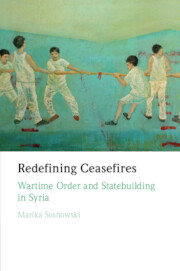
-
Select format
-
- Publisher:
- Cambridge University Press
- Publication date:
- 11 May 2023
- 25 May 2023
- ISBN:
- 9781009347204
- 9781009347228
- 9781009347242
- Dimensions:
- (229 x 152 mm)
- Weight & Pages:
- 0.46kg, 216 Pages
- Dimensions:
- (229 x 152 mm)
- Weight & Pages:
- 0.32kg, 216 Pages
You may already have access via personal or institutional login
Book description
Since 2012, ceasefires have been used in Syria to halt violence and facilitate peace agreements. However, in this book, Marika Sosnowski argues that a ceasefire is rarely ever just a 'cease fire'. Instead, she demonstrates that ceasefires are not only military tactics but are also tools of wartime order and statebuilding. Bringing together rare primary documents and first-hand interviews with over eighty Syrians and other experts, Sosnowski offers original insights into the most critical conflict of our time, the Syrian civil war. From rebel governance to citizen and property rights, humanitarian access to economic networks, ceasefires have a range of heretofore underexamined impacts. Using the most prominent ceasefires of the war as case studies, Sosnowski demonstrates the diverse consequences of ceasefires and provides a fuller, more nuanced portrait of their role in conflict resolution.
Awards
Short-listed, 2024 CRS Book Prize, Conflict Research Society
Reviews
‘This important book analyzes the complex relationship between conflict dynamics, political order, and governance by zooming in on the political, societal, and strategic impact of ceasefires in the context of the Syrian civil war. It offers a nuanced, original analytical prism through which to better understand civil wars. Essential reading for both scholars and policymakers.'
Benedetta Berti - Head of Policy Planning – NATO
‘Redefining Ceasefires makes a ground-breaking contribution to scholarship on ceasefires and state-building. Based on hard-to-collect data from the Syrian war, it presents a novel way to look at ceasefires by analysing them as types of wartime order. The book is of very high interest to both peace researchers and practitioners.'
Sara Hellmüller - Geneva Graduate Institute
‘Sosnowski makes a pathbreaking contribution to scholarship on civil wars by showing how ceasefires are not mere lulls in fighting, but instead shape wartime orders and even enable new forms of violence. Carefully theorized and powerfully illustrated with original data from Syria, this book is a must-read for students of conflict and practitioners in the field of conflict resolution.'
Wendy Pearlman - Northwestern University
‘This is the most interesting scholarly work on Syria I've read in years. Marika Sosnowski's outstanding analysis of primary documents and interviews shows how ceasefires - commonly understood as the first step towards peace - easily become a tool to reframe structural and systemic violence in the context of a power imbalance.'
Bente Scheller - Heinrich Böll Foundation
'… a must read for scholars researching civil wars, peacekeeping, state-building, regime-repression, and Syria.'
Benjamin Tkach Source: International Peacekeeping
‘This passionately argued book is an important contribution to policy debates on how ceasefires alter the course of civil wars … and a vital guide for scholars and policy makers alike.’
Kevin Mazur Source: Perspectives on Politics
‘This book is a very welcome addition to the specialized literature. It represents an important study for those trying to understand how local governance is constructed, maintained, and legitimized in armed conflict. I am indeed convinced that its findings will be of use beyond the Syrian context, informing strategies of engagement with local actors and also serving policymakers when negotiating ceasefires.’
Ezequiel Heffes Source: Articles of War
‘Sosnowski’s appropriately titled book redefines ceasefires using the Syrian civil war for narrative description. The excellently researched chapters on Syria’s experiences with ceasefires effectively applies the abductively generated typology in a dynamic, approachable, and detailed analysis. While focused on ceasefires, this book is a must read for scholars researching civil wars, peacekeeping, state-building, regime-repression, and Syria.’
Benjamin Tkach Source: International Peacekeeping
Contents
Metrics
Altmetric attention score
Full text views
Full text views help Loading metrics...
Loading metrics...
* Views captured on Cambridge Core between #date#. This data will be updated every 24 hours.
Usage data cannot currently be displayed.
Accessibility standard: Unknown
Why this information is here
This section outlines the accessibility features of this content - including support for screen readers, full keyboard navigation and high-contrast display options. This may not be relevant for you.
Accessibility Information
Accessibility compliance for the PDF of this book is currently unknown and may be updated in the future.


